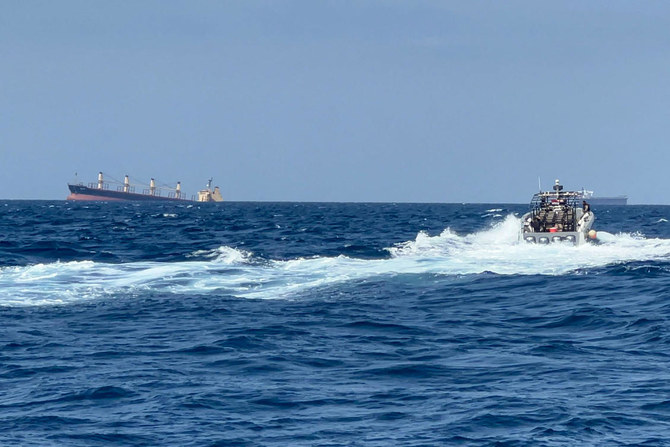DUBAI: A ship attacked by Yemen’s Houthi rebels has sunk in the Red Sea after days of taking on water, officials said Saturday, the first vessel to be fully destroyed as part of their campaign over Israel’s war against Hamas in the Gaza Strip.
The sinking of the Rubymar comes as shipping through the crucial waterway for cargo and energy shipments moving from Asia and the Middle East to Europe has been affected by the Houthi attacks.
Already, many ships have turned away from the route. The sinking could see further detours and higher insurance rates put on vessels plying the waterway — potentially driving up global inflation and affecting aid shipments to the region.
The Belize-flagged Rubymar had been drifting northward after being struck by a Houthi anti-ship ballistic missile on Feb. 18 in the Bab el-Mandeb Strait, a crucial waterway linking the Red Sea and the Gulf of Aden.
Yemen’s internationally recognized government, as well as a regional military official, confirmed the ship sank. The official spoke on condition of anonymity as no authorization was given to speak to journalists about the incident.
The Rubymar’s Beirut-based manager could not be immediately reached for comment.
Yemen’s exiled government said the Rubymar sank late Friday as stormy weather took hold over the Red Sea. The vessel had been abandoned for 12 days after the attack, though plans had been made to try and tow the ship to a safe port.
The Iran-backed Houthis, who had falsely claimed the ship sank almost instantly after the attack, did not immediately acknowledge the ship’s sinking.
The US military’s Central Command previously warned the vessel’s cargo of fertilizer, as well as fuel leaking from the ship, could cause ecological damage to the Red Sea.
Satellite pictures analyzed by The Associated Press from Planet Labs PBC showed smaller boats alongside the Rubymar on Wednesday. It wasn’t immediately clear whose vessels those were.
The private security firm Ambrey separately reported Friday about a mysterious incident involving the Rubymar.
“A number of Yemenis were reportedly harmed during a security incident which took place” on Friday, Ambrey said. It did not elaborate on what that incident involved and no party involved in Yemen’s yearslong war claimed any new attack on the vessel.
Since November, the rebels have repeatedly targeted ships in the Red Sea and surrounding waters over the Israel-Hamas war. Those vessels have included at least one with cargo bound for Iran, the Houthis’ main benefactor, and an aid ship later bound for Houthi-controlled territory.
Despite over a month of US-led airstrikes, Houthi rebels remain capable of launching significant attacks. That includes the attack on the Rubymar and the downing of an American drone worth tens of millions of dollars. The Houthis insist their attacks will continue until Israel stops its combat operations in the Gaza Strip, which have enraged the wider Arab world and seen the Houthis gain international recognition.
However, there has been a slowdown in attacks in recent days. The reason for that remains unclear.






















